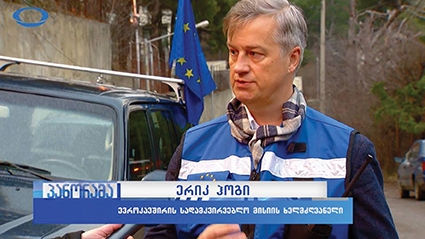24/7: EUMM Head on the Mission
Interview
A head of New Year’s Eve, when the whole country was enjoying the holidays, GEORGIA TODAY and Panorama TV Show paid a visit to a particularly watchful group of people, the European Union Monitoring Mission, which continues to carry out its patrolling routine 24/7 and which recently embarked on its epic 60,000th patrol since coming here. We joined them on this perilous journey, alongside the Mtskheta field office team (subject of a future issue of GEORGIA TODAY). Before that, we had the privilege of an exclusive, if brief, interview with the newly-appointed Head of Mission, Erik Høeg.
What is the relevance and importance of the EUMM?
We’re the only international monitors on the ground. We’ve been in Georgia since Oct 1, 2008, having been deployed immediately after the war. Since then we have been out patrolling and monitoring 24/7. We have done 60.000 patrols. Our key task is to look after the stability out there, with our patrols mostly moving along what we call the ABL (Administrative Boundary Line) between Georgia’s central government controlled and breakaway republics. We are also in the rest of Georgia. We follow the lives of men and women who have been affected by the conflict in villages along the ABL, and also IDPs. We have an important role in confidence building. We’ve established channels of communication and are very active in formats to discuss incidents and developments that could undermine stability, threaten security or raise tensions. These are the key things we’ve been doing here, and we will continue doing so. As of today, we have the strength of around 320 staff in the Mission. It’s a big commitment from the EU towards stability here in Georgia and the region. 2/3 of our staff are internationals, coming from most of the EU countries. 25 EU member states are represented in the Mission. 1/3 of colleagues are Georgian nationals, 114 to be exact, as of today. They help us in essential tasks: everything from translating/interpreting when we are out in the field to ensuring our finances are OK so we can run our Mission properly. Without their support, we would not be out there doing our job 24/7 all year.
What are the main limitations and challenges for the EUMM when it comes to carrying out its mandate?
The main limitation when it comes to carrying out our mandate, to doing what we are expected to do, is the lack of access of the mission to parts of Georgia which are not under central government control, Abkhazia and South Ossetia. Our mandate, formally speaking, encompasses the whole of Georgia within its internationally recognized borders, but from the beginning, we were denied access to the breakaways. We cannot patrol or monitor [there] and we do not have a presence there. We still find ways to see what’s going on; we gather info through other channels. We have a pretty good impression of what’s happening there but the fact we cannot fully implement our mandate is a problem and challenge; something raised by the EU and a priority for the EU to ensure that we implement the mandate as expected.
What would change if the EUMM had access to the de facto republics of Abkhazia and South Ossetia?
If we had access, we would be able to ensure better security and stability; we would be able to monitor the activities of security actors, follow conditions and the rights of the population on the other side of the ABL to a much higher degree. We would have a more complete picture. We would also be able to debunk, frankly, numerous inaccurate reports which we see in the regional media and, for number of reasons, it would be a big advantage. We still hope that one day we will have patrol cars of the EUMM crossing the ABL and doing our job as we should in Abkhazia and South Ossetia.
Vazha Tavberidze












